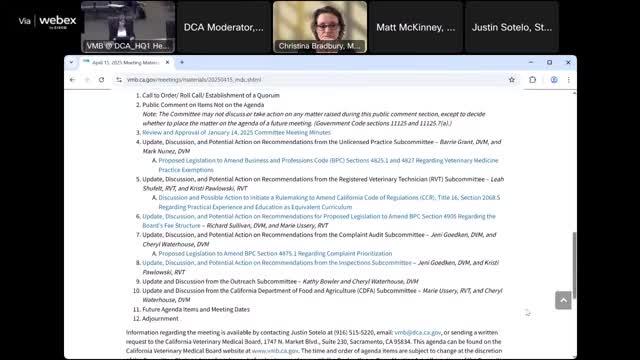Veterinary board refines licensure exemptions amidst unlicensed practice concerns
April 17, 2025 | Veterinary Medical Board, Boards and Commissions, Executive, California
This article was created by AI summarizing key points discussed. AI makes mistakes, so for full details and context, please refer to the video of the full meeting. Please report any errors so we can fix them. Report an error »

The California Veterinary Medical Board made significant strides during its meeting on April 17, 2025, focusing on enhancing veterinary practices and addressing unlicensed activities that pose risks to animal welfare. A key highlight was the update on the mobile inspection application, launched in November 2024, which has streamlined the inspection process, benefiting both veterinarians and regulatory bodies.
The board also discussed revisions to the hospital standard self-evaluation checklist, aligning it with current laws and removing outdated objectives. This effort aims to improve compliance and ensure that veterinary practices meet modern standards. The subcommittee anticipates a draft of the updated checklist will be ready by the July 2025 meeting.
In addressing unlicensed veterinary practices, the board proposed legislative amendments to narrow the scope of licensure exemptions. This move responds to concerns that the current owner exemption is being misapplied, allowing individuals associated with rescue groups to provide veterinary services without proper licensing, which has led to numerous complaints. The proposed changes aim to clarify that only owners of livestock or food animals can administer veterinary services, thereby protecting animal health and welfare.
The board also received input from stakeholders, including veterinarians and representatives from the California food animal community, who expressed concerns about the prevalence of unlicensed reproductive services and the challenges of recruiting licensed veterinarians. The discussions highlighted the need for a balanced approach that protects consumers while ensuring that necessary veterinary services are accessible.
Additionally, the Outreach Subcommittee reported on its efforts to educate the public about the importance of proper veterinary care and documentation, particularly in the context of unlicensed practices. They are working on materials aimed at both breeders and general consumers to raise awareness about the risks associated with unlicensed veterinary services.
As the board moves forward, it will continue to refine its legislative proposals and engage with stakeholders to ensure that the veterinary profession in California remains robust and capable of meeting the needs of both animals and their owners. The next steps will involve further discussions with the California Department of Food and Agriculture to assess the implications of the proposed changes and ensure that all voices are heard in this critical dialogue.
The board also discussed revisions to the hospital standard self-evaluation checklist, aligning it with current laws and removing outdated objectives. This effort aims to improve compliance and ensure that veterinary practices meet modern standards. The subcommittee anticipates a draft of the updated checklist will be ready by the July 2025 meeting.
In addressing unlicensed veterinary practices, the board proposed legislative amendments to narrow the scope of licensure exemptions. This move responds to concerns that the current owner exemption is being misapplied, allowing individuals associated with rescue groups to provide veterinary services without proper licensing, which has led to numerous complaints. The proposed changes aim to clarify that only owners of livestock or food animals can administer veterinary services, thereby protecting animal health and welfare.
The board also received input from stakeholders, including veterinarians and representatives from the California food animal community, who expressed concerns about the prevalence of unlicensed reproductive services and the challenges of recruiting licensed veterinarians. The discussions highlighted the need for a balanced approach that protects consumers while ensuring that necessary veterinary services are accessible.
Additionally, the Outreach Subcommittee reported on its efforts to educate the public about the importance of proper veterinary care and documentation, particularly in the context of unlicensed practices. They are working on materials aimed at both breeders and general consumers to raise awareness about the risks associated with unlicensed veterinary services.
As the board moves forward, it will continue to refine its legislative proposals and engage with stakeholders to ensure that the veterinary profession in California remains robust and capable of meeting the needs of both animals and their owners. The next steps will involve further discussions with the California Department of Food and Agriculture to assess the implications of the proposed changes and ensure that all voices are heard in this critical dialogue.
View full meeting
This article is based on a recent meeting—watch the full video and explore the complete transcript for deeper insights into the discussion.
View full meeting
